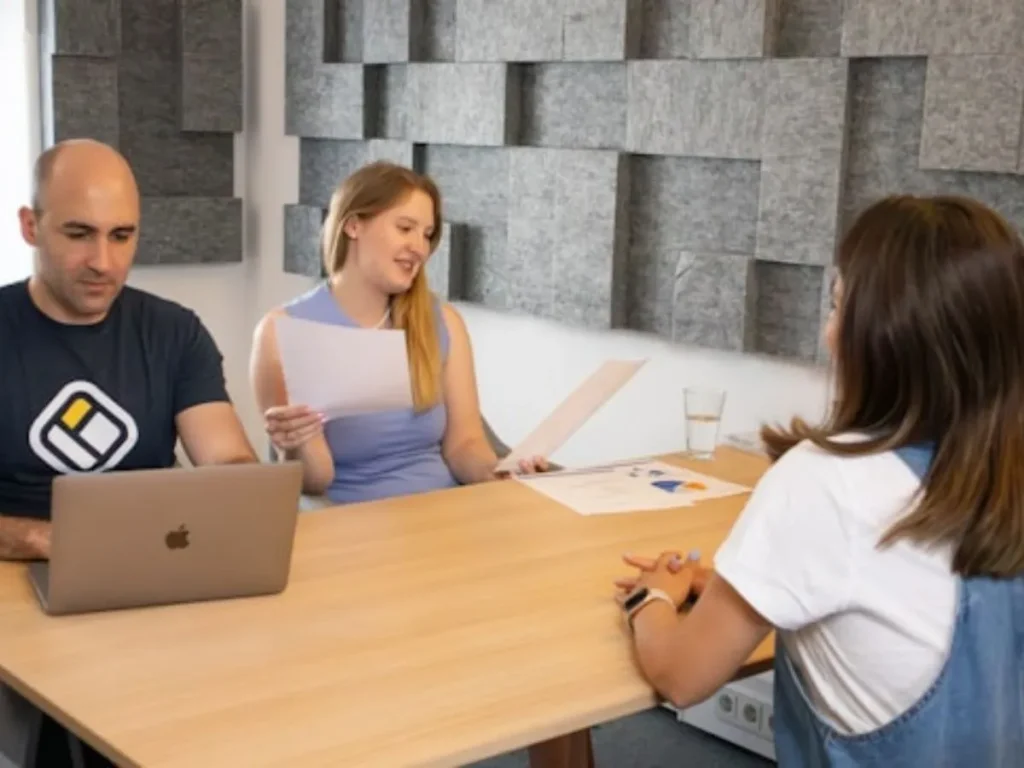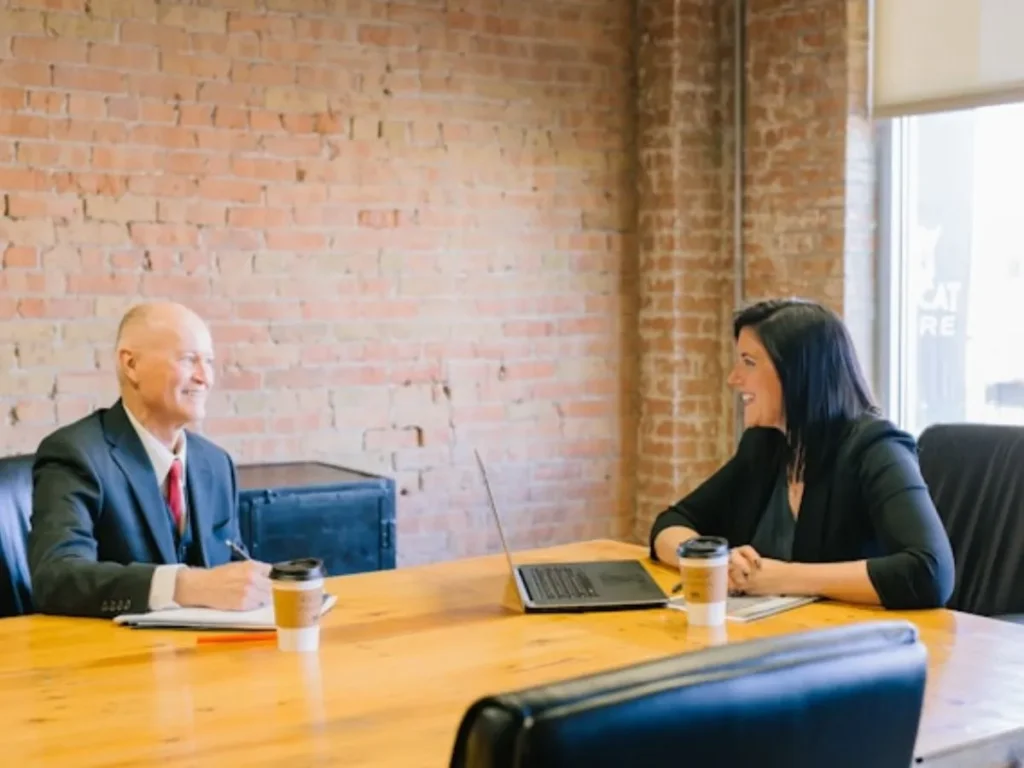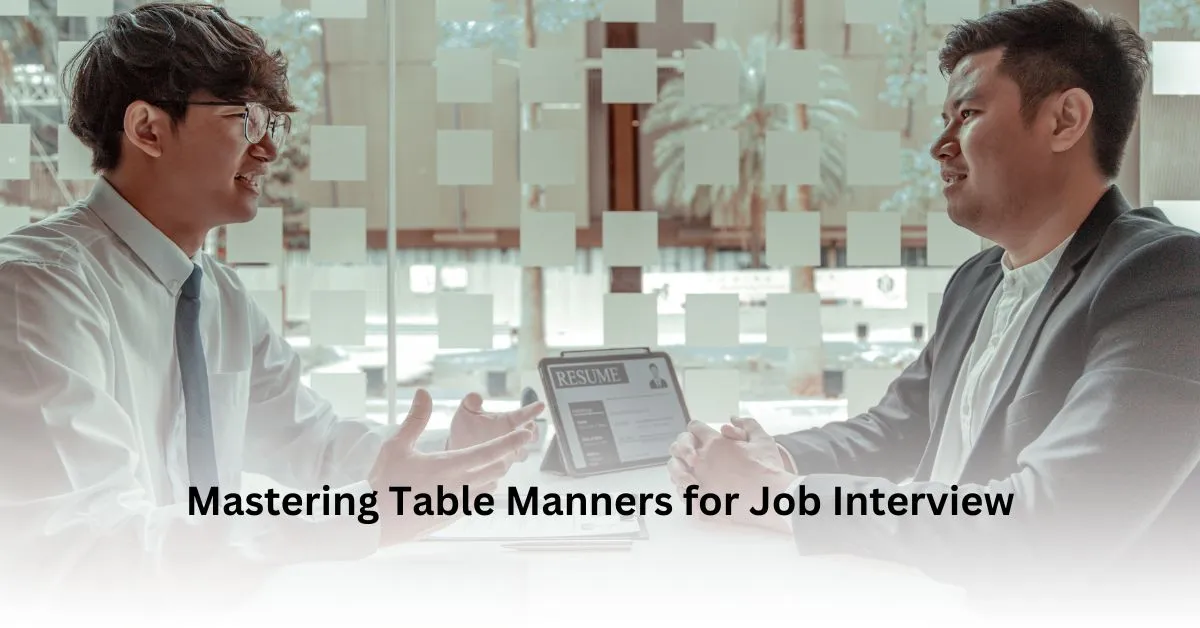In the competitive realm of job interviews, where initial impressions may determine the outcome of prospects, the importance of table etiquette is crucial. Employers frequently observe applicants’ conduct during a dinner to evaluate their professionalism, social skills, and cultural understanding, in addition to their excellent qualifications and well-crafted resume. Thus, mastering table manners for job interviews is not merely about showcasing refinement; it’s about demonstrating respect, adaptability, and suitability for the role and organization.
What is Interview Etiquette?
Interview etiquette refers to the social norms and practices that dictate how job hopefuls and potential employers should interact. Traditional interviews often take place in office settings with face-to-face talks, but many firms now opt for a more informal approach, such as conducting interviews during meals. Dining interviews at restaurants or corporate dining rooms provide distinct difficulties and chances for applicants to stand out.
Table Manners for Job Interviews
- Impression Management: Table manners for job interviews extend beyond basic etiquette; They function as a means of controlling the perception others have of them. Every action, such as sitting gracefully and participating in polite conversation, influences how professional and suitable one seems for a task.
- Communication Skills: Effective communication is crucial in every job interview, and table manners are important in showing one’s ability to speak confidently and tactfully. Candidates can display their communication skills effectively during a meal by actively listening, making proper eye contact, and expressing their opinions clearly.
- Cultural Sensitivity: Cultural competency is highly prized in today’s worldwide workforce. Proper Table manners for job interviews demonstrate an individual’s understanding and appreciation of ethnic diversity in eating customs and manners. Candidates who demonstrate cultural sensitivity show their capacity to adapt and their open-mindedness to varied work contexts, whether using chopsticks in a sushi restaurant or following continental eating customs.
- Relationship Building: Employers look for applicants who can establish rapport and create lasting ties with clients and colleagues, in addition to individuals who meet certain requirements. reveals a candidate’s interpersonal abilities, such as engaging in polite conversation, showing gratitude, and being considerate of others’ preferences.

- Professionalism Under Pressure: The purpose of dining interviews is to evaluate applicants’ composure and professionalism under high-pressure situations. Candidates must demonstrate their capacity to adapt and problem-solve in real-time by gracefully managing unusual dishes and overcoming unanticipated dining accidents.
- Brand Representation: Candidates serve as ambassadors for both themselves and the firm they aim to work for. Candidates can strengthen their connection to the corporate culture and brand identification by demonstrating the organization’s principles and standards of conduct over a meal.
- Memory-Making Moments: Table manners for job interviews create memorable moments that linger in the minds of employers long after the meal concludes. Candidates who demonstrate real gratitude towards the waitstaff and express considerate civility towards fellow customers make a favorable impression in a competitive employment market.
- Competitive Advantage: In the current highly competitive job market, where qualifications and experience are typically similar among candidates, exceptional table manners may set individuals apart. Candidates may distinguish themselves from the competition and make a lasting impression on potential employers by displaying flawless manners and social elegance.
Setting the Stage with Table Manners for Job Interviews
In the competitive context of employment interviews, every aspect is important, even one’s behavior before the meal starts. Comprehending and following correct table manners for job interviews may greatly influence the interview process, from the first impression to the final choice.
Significance of Seating Etiquette and Posture
Candidates must be aware of their seating etiquette and posture before sitting down at the table. How an individual enters the eating room, approaches the table, and takes their seat communicates subtle yet impactful messages to the interviewer. Every movement and gesture should emanate confidence, respect, and professionalism.
Demonstrating good posture throughout the interview shows attentiveness and self-confidence. Slouching or fidgeting may indicate uneasiness or a lack of confidence, which might harm the candidate’s trustworthiness. Candidates can project confidence and competence to interviewers by maintaining good posture, keeping both feet grounded, and actively listening.

Making Appropriate Meal Selections
Another aspect of table manners for job interviews involves making appropriate meal selections. Candidates should carefully evaluate their preferences and the interview situation before selecting items from the menu. Choosing easily manageable foods can help candidates traverse the eating experience without distractions or embarrassment.
Candidates should refrain from ordering messy or strongly scented foods that may distract from the interview’s main topic. Choosing products that are both enjoyable and useful shows careful thinking and concern for the interviewer’s experience. Candidates might enhance their prospects by projecting expertise and solid judgment through intelligent menu choices.
Preparing for the Dining Experience
Before entering the restaurant, candidates should mentally and emotionally ready themselves for the eating experience. Disabling cell phones or beepers in advance is not just politeness but also a display of respect for the interviewer’s time and focus. Moreover, attentively following the interviewer’s directions and refraining from discussing sensitive subjects guarantees a seamless and efficient conversation during the meal.
Candidates should take advantage of every chance to present themselves positively, use the time before a meal to interact with the interviewer, and quietly demonstrate their credentials and appropriateness for the position. Candidates can enhance their chances of success in the interview process by demonstrating professionalism and awareness in every part of the pre-meal experience.
Navigating Table Manners for Job Interviews During the Meal
Mastering table manners for job interviews is crucial as the meal begins. This round of interviews allows applicants to demonstrate their professionalism, social skills, and flexibility in a calm yet evaluative environment.

Handling the Various Courses
Successfully managing the different courses of a meal in a job interview demands delicacy and meticulous attention to detail. Knowing how to set the table properly and following napkin etiquette are crucial aspects of showcasing refined table manners for job interviews.
Candidates must remain composed and confident among the many utensils and foods in front of them. Offering instructions on how to handle various utensils and courses enables individuals to navigate the eating experience confidently and elegantly.
Communicating with Body Language
Verbal communication is crucial in a job interview, but body language may convey a lot of information as well. Candidates should aim to remain calm and project confidence by their posture, even if they are feeling nervous. Abstaining from resting elbows on the table and displaying a confident attitude throughout the meal conveys professionalism and self-assurance to interviewers.
Engaging with Interviewers
Job interviews sometimes include numerous interviewers sitting at the dining table with the candidate. Candidates should wait for everyone to be seated before laying their napkins on their lap at the start of the meal. When a disaster occurs, like a spilled napkin, asking the server for a replacement in a gracious manner shows composure and adaptability.
Making Thoughtful Menu Choices
Candidates must carefully choose their meals as they look over the menu. Choosing simple and non-disruptive foods like affordable chicken or fish demonstrates good decision-making and thoughtfulness towards the eating setting. Being nice and utilizing courteous language like “please” and “thank you” when interacting with wait staff during a meal enhances the perception of professionalism and respect.

Interview Dining Etiquette Tips
If your job interview involves a meal, it is imperative that you wow the interviewer with your impeccable table manners. To help you dine with poise and elegance, here are a few pointers:
Gracefully Managing Dining Mishaps:
Navigating the dining experience during a job interview requires finesse and preparation. Here, we present a comprehensive guide to mastering interview dining etiquette, ensuring candidates can navigate the meal with confidence and poise.
Strategies for gracefully handling dining mishaps:
- Handle spills or incidents gently and discretely.
- Use napkins to swiftly wipe up any spillage.
- If required, offer a sincere apology and proceed graciously.
- Avoid bringing excessive attention to the mishap.
- Maintain your composure and continue the conversation.
- If you need help, ask the waitstaff quietly.
- Concentrate on the conversation and the entire eating experience.
- Remember that how you manage errors demonstrates your professionalism and agility.
Advice on Ordering Drinks and Understanding Menu Items:
- Choose drinks that are acceptable for the event and will not interfere with communication.
- If you are confused or uncomfortable around alcohol, consider drinking non-alcoholic beverages instead.
- If you’re undecided about a specific cocktail, ask the waiter for advice.
- Familiarize yourself with basic beverage alternatives, including water, soda, and juice.
- When ordering, be sure to include any dietary requirements or preferences.
- To avoid surprises, get clarification on any unusual menu items.
- To make informed decisions, pay attention to portion sizes and prices.
- Remember to be grateful and courteous while talking with the waitstaff.

Mastering Post-Meal Etiquette
Understanding table manners for job interviews is crucial due to the intense scrutiny of every gesture and interaction throughout the delicate choreography of the interview process. Candidates’ behavior during the post-meal part of the interview process still influences the impression they make on potential employers. Comprehending and implementing the post-meal etiquette, from kind goodbyes to managing payment smoothly, is crucial for candidates seeking to create a favorable and enduring impression.
Outlining Polite Ways to Excuse Oneself and Handle Payment
After the meal concludes, candidates find themselves in a critical juncture where they must gracefully excuse themselves while ensuring that all financial matters are taken care of smoothly. This delicate balance in post-meal etiquette is crucial, as it reflects the candidate’s ability to handle social situations with finesse and professionalism.
Addressing Discomfort or Illness During the Meal
Addressing discomfort or illness during a meal is a unique difficulty for applicants. Unexpected physical discomfort or illness might interrupt the interview process and put the candidate’s ability to stay calm under pressure to the test. How candidates handle such circumstances reflects their professionalism and composure. In this sense, it is critical to have plans in place to confront and manage discomfort or illness with subtlety and grace.
When confronted with discomfort or illness during a meal, applicants should prioritize their health while being professional. One good method is to gently excuse oneself from the table while expressing thanks for the opportunity to eat with the interviewers. It is critical to talk calmly and succinctly explain the reason for leaving, without bringing unnecessary attention to oneself.
After excusing themselves, applicants should make suitable adjustments, such as visiting the toilet or finding a quiet place to relax. If required, applicants should consider contacting the interviewer or a member of the restaurant staff for assistance or accommodations.
Throughout the procedure, it is critical to keep a controlled manner and convey gratitude to the interviewers for their understanding and assistance. Candidates should try to return to the table as soon as they feel comfortable and capable of continuing the discourse.
Overall, dealing with discomfort or illness at a meal demands calm, subtlety, and a focus on well-being. By addressing such situations with elegance and professionalism, applicants may demonstrate their ability to manage difficult situations while making a good impression on potential employers.

Common Table Manners Questions and Concerns (FAQ’s)
As candidates navigate the dining component of job interviews, various scenarios may arise that require quick thinking and adherence to proper etiquette. Here, we provide solutions for common table manners questions and concerns, ensuring candidates can handle any situation with grace and professionalism.
1. Recovering from a Dropped Napkin:
If a napkin is accidentally dropped, calmly retrieve it from the floor without drawing attention to the incident. Quickly fold or refold the napkin before placing it back on your lap.
2. Accommodating Food Allergies or Dietary Restrictions:
Inform the waiter of any food allergies or dietary restrictions when ordering. Politely inquire about alternative options or modifications to accommodate your needs.
3. Coping with Unexpected Menu Items:
If faced with an unexpected menu item, seek clarification from the waiter regarding its ingredients or preparation. Consider asking for recommendations or opting for a safer, familiar choice.
4. Dealing with Undesirable Discoveries in Food:
If you discover something undesirable in your food, discreetly set it aside without making a fuss. Avoid drawing attention to the issue and continue with your meal.
5. Managing Pace and Finishing the Meal Gracefully:
Pace yourself throughout the meal to align with the speed of your dining companions. Avoid rushing or lingering excessively over your food. When finished, place your utensils parallel across the plate to signal completion.
6. Etiquette for Adjusting Attire During Dining:
If the need arises to adjust your attire during the meal, do so discreetly and subtly. Excuse yourself from the table if necessary and make adjustments in a private area such as the restroom.
Also Read: Where Should the Water Glass Be Placed on the Table?
Conclusion
In conclusion, mastering table manners for job interviews is essential for leaving a lasting positive impression on potential employers. Throughout the dining experience, candidates must uphold professionalism, grace, and attentiveness to detail. Let’s summarize the key etiquette points discussed and offer encouragement for further refinement.
Summarizing Key Etiquette Points for Job Interview Dining:
- Proper posture and sitting etiquette demonstrate professionalism.
- Navigating numerous courses and utensils shows versatility.
- Gracefully handling mealtime blunders demonstrates composure under pressure.
- Courteous engagement with waitstaff promotes a nice atmosphere.
Encouraging Practice and Refinement of Table Manners:
- Regular practice and improvement of table manners are essential for success in job interviews.
- Candidates should practice eating settings and seek feedback to enhance their manners.
- Candidates can boost their confidence and professionalism by implementing proper table manners into their everyday practice.
Offering Additional Resources for In-Depth Etiquette Learning:
- Books, online courses, and workshops all offer useful insights on eating etiquette.
- Professional mentors and etiquette coaches provide individualized guidance and assistance.
- Mock dinner interviews and role-playing exercises can help improve practical abilities.
